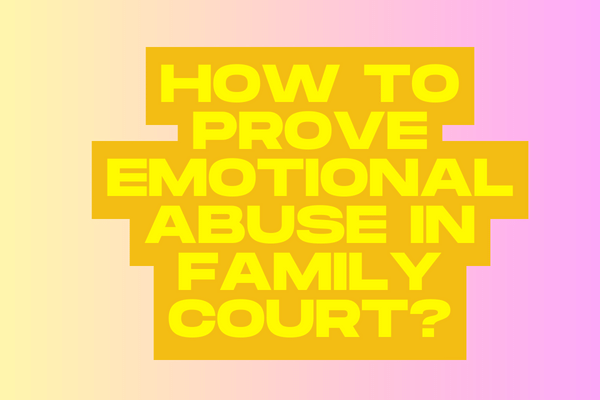So How to Prove Emotional Abuse in Family Court?
Emotional abuse is a serious issue that can have long-lasting effects on individuals and families. In family court, proving emotional abuse can be challenging, as it often leaves no physical evidence. However, with the right approach and supporting evidence, it is possible to demonstrate emotional abuse and seek appropriate legal remedies.
This article provides a comprehensive guide on how to prove emotional abuse in family court, offering valuable insights and strategies for those navigating this difficult situation.
Table of Contents
- Introduction: Understanding Emotional Abuse
- Recognizing the Signs of Emotional Abuse
- Documentation and Evidence Gathering
- Expert Witnesses and Professional Assessments
- Witness Testimonies and Affidavits
- Communication Records and Documentation
- Seek Support and Counseling
- Consultation with an Experienced Attorney
- Child Custody Evaluations
- Protective Orders and Restraining Orders
- Court Hearings and Presenting Your Case
- Cross-Examination and Defense Strategies
- The Importance of Self-Care
- Alternative Dispute Resolution Methods
1. Introduction: Understanding Emotional Abuse
In this section, we will define emotional abuse and explain its impact on individuals and families. We will explore how emotional abuse differs from other forms of abuse and why it is crucial to address it in family court proceedings.
2. Recognizing the Signs of Emotional Abuse
Identifying the signs of emotional abuse is essential to build a strong case. This section will delve into common behaviors and patterns exhibited by emotional abusers, helping individuals recognize and document these behaviors.
3. Documentation and Evidence Gathering
To prove emotional abuse, documentation and evidence are critical. This section will guide individuals on how to collect relevant evidence, including journals, photographs, videos, and any other supporting materials that demonstrate the occurrence and impact of emotional abuse.
4. Expert Witnesses and Professional Assessments
Expert witnesses and professional assessments can significantly strengthen an emotional abuse case. This section will discuss the importance of obtaining evaluations from mental health professionals who specialize in emotional abuse and its effects on victims.
5. Witness Testimonies and Affidavits
Collecting witness testimonies and affidavits from individuals who have observed or experienced emotional abuse can provide valuable corroboration. This section will explore how to obtain these statements and effectively present them in court.
6. Communication Records and Documentation
Written and electronic communications can serve as crucial evidence in proving emotional abuse. This section will explain how to gather and preserve emails, text messages, social media posts, and other forms of communication that demonstrate abusive behavior.
7. Seek Support and Counseling
Emotional abuse can have severe psychological effects on victims. Seeking support and counseling not only helps individuals heal but also provides professional documentation of the abuse. This section will emphasize the importance of therapy and support networks.
8. Consultation with an Experienced Attorney
Navigating family court proceedings can be complex, which is why consulting with an experienced attorney is vital. This section will highlight the role of an attorney and provide guidance on selecting the right legal representation.
9. Child Custody Evaluations
Child custody cases involving emotional abuse require careful evaluation. This section will outline the steps involved in a child custody evaluation and the factors considered by evaluators in cases of emotional abuse.
10. Protective Orders and Restraining Orders
Obtaining a protective order or restraining order can offer immediate protection against emotional abuse. This section will explain the process of obtaining these orders and the legal implications they carry.
11. Court Hearings and Presenting Your Case
Preparing for court hearings and effectively presenting your case is crucial to proving emotional abuse. This section will provide guidance on courtroom etiquette, organizing evidence, and delivering persuasive arguments.
12. Cross-Examination and Defense Strategies
Anticipating cross-examination and understanding defense strategies is essential to counter any challenges in proving emotional abuse. This section will offer insights into potential defense tactics and suggest ways to respond effectively.
13. The Importance of Self-Care
Emotional abuse can take a toll on the well-being of victims. This section will emphasize the significance of self-care, providing practical tips and resources to help individuals prioritize their mental and emotional health during the legal process.
14. Alternative Dispute Resolution Methods
In some cases, alternative dispute resolution methods, such as mediation or collaborative law, can provide a less adversarial approach to resolving emotional abuse cases. This section will explore these alternative methods and their benefits.
FAQs (Frequently Asked Questions)
1. Can emotional abuse be as damaging as physical abuse? Emotional abuse can be just as damaging, if not more, than physical abuse. It can have severe and long-lasting effects on a person’s mental and emotional well-being.
2. Is it possible to prove emotional abuse without physical evidence? Yes, emotional abuse can be proven without physical evidence. Documentation, witness testimonies, and professional assessments can all contribute to building a strong case.
3. What if the abuser denies the allegations of emotional abuse? If the abuser denies the allegations, it becomes crucial to present compelling evidence and testimonials to support your claims. A skilled attorney can help you navigate these challenges.
4. How long does the process of proving emotional abuse in family court typically take? The duration of the process can vary depending on various factors, such as the complexity of the case, court schedules, and the availability of evidence. It is advisable to consult with an attorney for a more accurate estimation.
5. How can I protect myself and my children during the legal proceedings? Obtaining a protective order or restraining order can offer immediate protection. Additionally, seeking support from counselors, support groups, and trusted friends or family members can provide emotional support during this challenging time.
Conclusion
In conclusion, proving emotional abuse in family court is a challenging but essential process. By recognizing the signs, gathering substantial evidence, seeking professional help, and presenting a well-structured case, individuals can increase their chances of success. Remember to prioritize self-care and seek support throughout the legal journey.
Visit the link to read more: https://family-fitness-fun.com/how-affluence-pulls-people-away-from-their-families/





